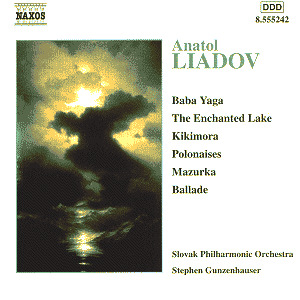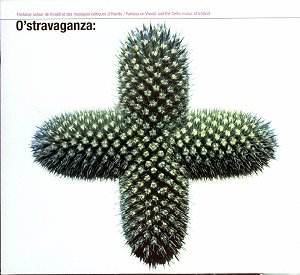 Composer: Anatol Liadov
Composer: Anatol Liadov
Works: Intermezzo, Op. 8; Mazurka, Op. 19; Ballade, Op. 21b; Polonaise, Op. 49; Polonaise, Op. 55; Baba Yaga, Op. 56; The Enchanted Lake, Op. 56; Kikimora, Op. 63; The Apocalypse (fragment), Op. 66; Nänie, Op. 67
Performers: Slovak Philharmonic Orchestra, Stephen Gunzenhauser (conductor)
Recording: May 1985, Concert Hall of the Slovak Philharmonic, Bratislava
Label: NAXOS 8.555242
The life and works of Anatol Liadov often evoke a fascinating tension between potential and realization. While he is often overshadowed by his contemporaries, particularly Stravinsky, his compositions reveal a unique voice characterized by a lush orchestral palette and a penchant for evocative miniatures. This Naxos reissue allows for a fresh reassessment of his oeuvre, showcasing a range of pieces that capture the essence of his style—delicate yet vivid, and imbued with a sense of mystique drawn from Russian folklore and mythology.
Stephen Gunzenhauser and the Slovak Philharmonic Orchestra deliver a performance that is both engaging and meticulously crafted. The opening piece, “Baba Yaga,” serves as an exemplary introduction to Liadov’s world, with its intricate rhythmic structures and vivid orchestrations. The witch’s portrayal is both agile and menacing, underscored by the orchestra’s deft handling of dynamics and color. Gunzenhauser’s interpretation thrives on contrasts, employing a wide dynamic range that captures the capricious nature of the subject. The woodwinds, particularly, shine in their haunting dialogues, providing a sense of narrative that Liadov intended.
The two Polonaises, Op. 49 and Op. 55, reveal a different facet of Liadov’s artistry. Here, the nobility of the dance is palpable, and the tempos chosen by Gunzenhauser allow for a buoyancy that enhances the festive character. The phrasing is particularly noteworthy; it breathes life into the melodies, drawing out their lyrical qualities while maintaining structural integrity. The balance between the strings and brass is especially commendable, as it brings forth the grandeur inherent in the form without overpowering the subtleties of the woodwinds.
“The Enchanted Lake,” arguably one of Liadov’s most celebrated works, exemplifies his mastery of orchestral color. The lush sonorities and impressionistic textures evoke an ethereal landscape, and the Slovak Philharmonic’s nuanced playing imbues the music with a dream-like quality. The performance captures the gentle ebb and flow of the piece, though the recorded sound leaves something to be desired. The engineering lacks the vibrancy and clarity that one hopes for in such a richly orchestrated score, leading to moments where the instrumental colors blend rather than shimmer.
In the fragment “The Apocalypse,” a work that reflects Liadov’s later style, one senses an evolution in his musical language. The orchestration is bold, yet it retains the delicate touch that characterizes much of his earlier work. This recording, while not definitive, provides a substantial glimpse into the composer’s intent. The performance’s commitment is evident, yet it occasionally lacks the dramatic impact that such a fragment could convey. The climaxes feel muted, which diminishes the emotional weight that could have been achieved.
Overall, this Naxos release is a valuable addition to the catalog of Liadov’s works, presenting an opportunity to appreciate his artistry beyond the shadow of his more famous peers. While the recording quality does not always do justice to the rich orchestral textures, the performances are characterized by a thoughtful approach and a clear understanding of the music’s emotional landscape. Collectively, these interpretations reveal Liadov not merely as a footnote in the history of music, but as a composer of genuine sophistication and charm, deserving of renewed attention and respect.



